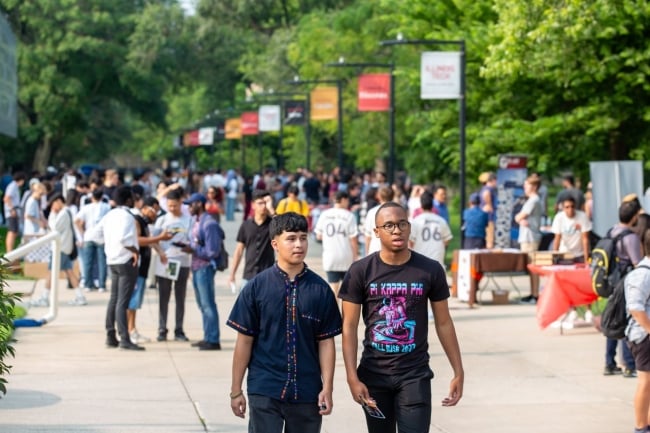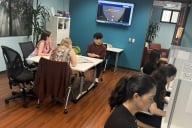You have /5 articles left.
Sign up for a free account or log in.

Students at Illinois Tech can opt in to a certified peer mentorship program that supports their learning, metacognition and leadership skills, as well as impacts other students’ academics.
Illinois Tech
Students in need of academic help at the Illinois Institute of Technology are getting the benefits of a peer support system that empowers learners with self-awareness and professional skills, not just assistance with content. The tiered peer-support initiative trains successful students to develop learning and emotional skills, which they can pass along to their classmates.
The Empowerment, Leadership and Mentorship program, embedded throughout the institution, has demonstrated an impact on students’ grades and persistence rates, as well as building students’ leadership and professional experiences.
Joseph Orgel, ELM director and vice provost for academic affairs, was inspired to create the program after talking to stopped-out students a year after they left the university. A key theme among these learners’ experiences was that they felt like they weren’t able to keep up academically, so identifying ways to get them back on track in their coursework would be one way to improve retention and graduation.
What’s different: Historically, Illinois Tech has offered guided academic supports such as tutoring, supplemental instruction and guidance for those on academic probation, but these were focused more on content than on student development. ELM goes a step beyond that and certifies peer leaders who can teach others effectively and empathetically.
Orgel found students with a support system, typically those who were continuing-generation students, were more likely to succeed, so he wanted to develop an initiative that would create support systems for students throughout the university.
“Trained student mentors create a relatable connection with their peers,” Orgel explains. “Having recently navigated similar academic challenges themselves, they can offer relevant advice and support based on personal experiences.”
How it works: The program is run by the Office of the Vice Provost for Academic Affairs, including undergraduate and graduate academic affairs and the academic resource center. Other offices—including campus life, student health and wellness, career services, residence life, and alumni and student organizations—provide support as well.
Peer mentors are embedded in three different ways: in classrooms, in the Academic Resource Center, and in general learning strategy courses (a one-credit study and metacognition strategies course).
ELM has five pillars in its work, which encourage rational, empathetic and emotional intelligence among participants:
- Active listening
- Active speaking
- Self-awareness
- Self-compassion
- Shared leadership (shared governance)
To become a peer mentor, students must be nominated or express interest in the work and then participate in a 90-minute workshop that helps develop their skills. Some receive additional training to serve in academic coaching or class-specific roles, Orgel says. There are around 30 to 60 peer mentors in specific jobs each semester, but all students are encouraged to be trained in ELM, because it can benefit them, too.
Students can also choose to complete additional training to become a certified peer mentor, which includes an application, workshop attendance as well as completing an online training and written exam (to establish proficiency in different academic areas) and working alongside other peer mentors to get certified. At present, there are around 30 certified peer mentors, but more than 100 have been trained over the program’s life span.
Peer mentors are supervised by staff in their roles, but for the most part the model is self-sustaining as it’s a train-the-trainer system, Orgel says.
The impact: Participants in the program see a half-a-letter-grade improvement (or around 13 percent) on average, regardless of their standing, Orgel says. Students on probation have a 15 percent higher retention rate compared to their peers, and first-generation students are more likely to achieve a higher average GPA than the total student population.
Additionally, the program benefits the student experience through providing study assistance, personalized coaching and mentorship. Peer mentors also have more self-awareness and improved communication and metacognition skills.
Part of the program’s success comes from improving conditions for students to learn in and building them an empathetic support system. Students may not be doing anything differently, but if they are in an environment in which someone believes they’re getting helped, they should be getting better, Orgel says.
“The program fosters a supportive learning environment where students feel comfortable seeking help and collaborating with peers, further contributing to their overall success,” he explains.
While first-generation students see the most success in the program, all students stand to benefit from the initiative, learning how to study and contributing to a larger system of care that encourages peer education and encouragement.
Get more content like this directly to your inbox every weekday morning. Subscribe here.








